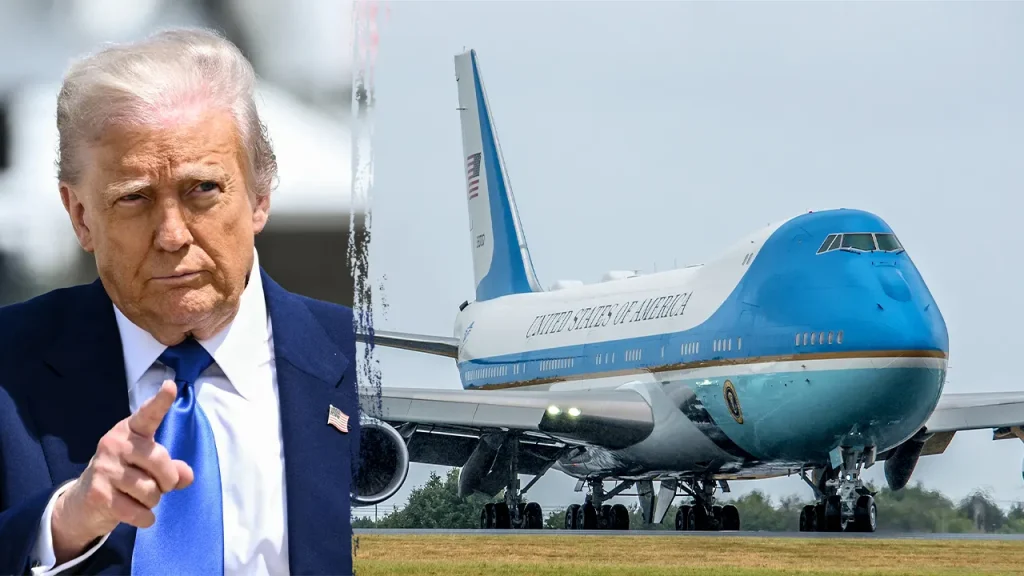President Donald Trump is under fire for accepting a $400 million airplane from Qatar, a gesture that has drawn criticism even from some of his staunchest allies, including activist Laura Loomer. While Trump defends the decision as a necessary step for upgrading the aging Air Force One fleet, critics question the implications of accepting a foreign gift. This situation has led to calls for an ethics investigation and ignited a national debate about the relationship between the U.S. and Qatar.
| Article Subheadings |
|---|
| 1) The $400 Million Plane Gift |
| 2) Reactions from Allies and Critics |
| 3) The Ethics of the Deal |
| 4) Implications for U.S.-Qatar Relations |
| 5) Conclusion and Future Outlook |
The $400 Million Plane Gift
Recently, President Donald Trump announced that he has accepted a $400 million airplane from Qatar as a “great gesture” meant to strengthen ties between the two nations. Trump emphasized the significance of this gesture, mentioning that it comes as a token of gratitude for the protection the U.S. provides to Qatar and the UAE. The aircraft, a luxury 747, is expected to replace the aging Air Force One planes that have been in operation for more than 40 years. The choice to accept an aircraft from a foreign government, especially from a Gulf state like Qatar, raises eyebrows and questions about the motivations behind such gifts.
Reactions from Allies and Critics
The announcement has sparked a range of reactions from various quarters, with one of the most notable voices being hard-right activist Laura Loomer. Loomer has been vocal in her disappointment, declaring that accepting what she describes as a “gift from jihadists” undermines Trump’s stance on terrorism and national security. Loomer’s remarks highlight the deeper internal conflicts within Trump’s support base regarding issues of loyalty and ethical governance. Additionally, the media have amplified these concerns, eliciting widespread scrutiny and debate over the implications of such an acceptance.
The Ethics of the Deal
Calls for an ethics investigation into the acceptance of the $400 million airplane have emerged, particularly because the U.S. Constitution prohibits federal officials from accepting personal gifts from foreign governments without congressional approval. This clause may lead to significant legal ramifications for both Trump and his administration, raising questions about the transparency and legitimacy of the deal. Trump’s legal team initially considered a plan where the aircraft would be donated directly to the future Trump Library, but they quickly backed off, fearing potential constitutional violations.
Implications for U.S.-Qatar Relations
Accepting such a substantial “gift” from Qatar may serve to complicate U.S. relations with other Gulf nations and groups that consider Qatar a controversial ally. On one hand, the airplane could symbolize a strengthening of ties and cooperation, yet it also risks being perceived as a political liability within the U.S., especially among those advocates who view Qatar’s global financial support of entities that oppose U.S. interests unfavorably. The decision underscores the complex nature of international relations, where gestures of goodwill can be received with skepticism.
Conclusion and Future Outlook
As President Donald Trump continues to navigate the criticism surrounding the Qatar airplane gift, the political landscape remains uncertain. While Trump insists that the gesture will ultimately serve the interests of the U.S. Department of Defense by upgrading its fleet, detractors argue that accepting large gifts from foreign governments can have long-term political consequences. Moving forward, the administration may need to provide more transparency and justification for such actions to mitigate the fallout from this controversial decision.
| No. | Key Points |
|---|---|
| 1 | Trump accepts a $400 million airplane from Qatar, provoking controversy. |
| 2 | Critics, including Laura Loomer, condemn the decision as a betrayal of anti-terrorism principles. |
| 3 | Legal and ethical questions arise regarding the acceptance of foreign gifts. |
| 4 | The move may complicate U.S.-Qatar relations and impact domestic political dynamics. |
| 5 | Future implications remain uncertain as Trump navigates criticism. |
Summary
The acceptance of a $400 million aircraft from Qatar by President Donald Trump has ignited a significant political debate centered on ethics, foreign relations, and national security. Critics from various sectors argue this decision undermines Trump’s prior positions on combating terrorism and poses potential legal challenges. As the President continues to defend this perceived “gift,” the discourse surrounding it underscores the complexity of navigating relationships between international allies and domestic political sentiments.
Frequently Asked Questions
Question: What was the reason behind Trump accepting the airplane from Qatar?
Trump stated that the airplane is a gesture of goodwill from Qatar, acknowledging the safety the U.S. provides to the Gulf nation. He referenced the need to modernize Air Force One, which has been in service for decades.
Question: Who criticized Trump’s decision regarding the airplane gift?
One of the main critics is activist Laura Loomer, who has voiced disappointment, suggesting that accepting the plane contradicts Trump’s anti-terrorism stance and could be damaging to his political image.
Question: What are the potential legal implications of this deal?
The U.S. Constitution prohibits federal officials from accepting personal gifts from foreign governments without congressional approval, which could lead to legal challenges and calls for an ethics investigation into the matter.
